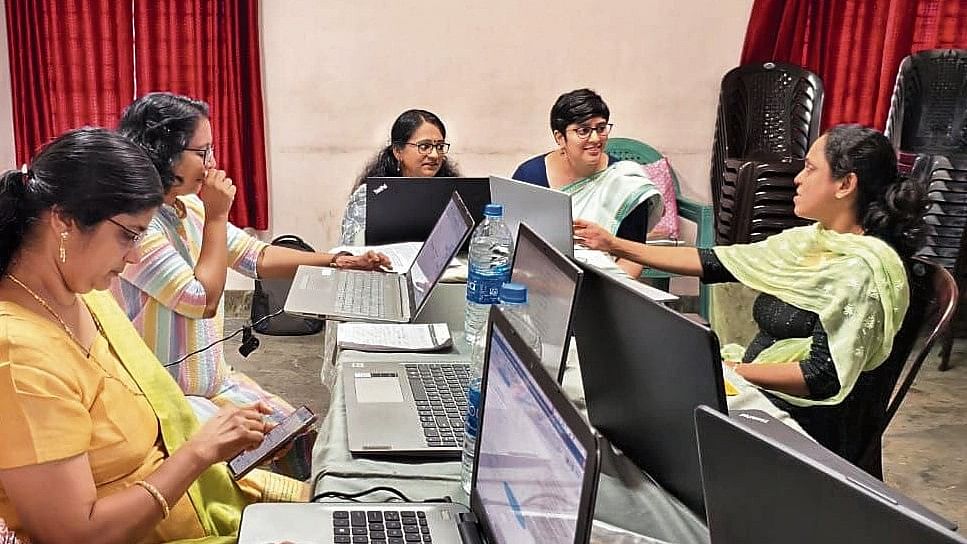
The workshop with teachers.
Credit: Special arrangement
The National Curricular Framework for Teacher Education 2009 (NCFTE), an inspiring document for Indian education, calls for the development of teachers who are professional and humane. While the ‘professional’ (skill) requirement is obvious, the ‘humane’ element, requiring consistent empathetic engagement with students, is even more important. This can provide the ‘will’ for teachers to push themselves towards greater professional competence in their work.
We at IT for Change were fortunate to engage with fourteen such ‘professional and humane’ English Language teachers in a two-day writing workshop organised by the Thrissur District Centre for English (DCE). This was an opportunity for these teachers to write about their innovative pedagogies (methods of teaching) that had made learning English enjoyable and effective for their students. Each teacher had innovated in areas as diverse as puppetry, theatre, sports, word games, collaborative reading, and writing activities in their practice. These pedagogies got their learners engaged and interested in language learning.
These teachers had earlier presented their work in a seminar organised by DCE, and many wanted to share their work, experiences, and insights with their colleagues across the district. Perhaps by writing an article or a paper? Though academic writing was new territory for most teachers, the trainers encouraged them to imagine themselves as ‘teacher-writers’ and ‘women intellectuals’).
Such ambition would resonate with the NCFTE’s clarion call that reflective practice is at the heart of teacher education. Reflective practice is aided by the process of writing about one’s work. Writing would enable the teacher to go beyond teaching mechanics, to reflect on their experiences and learn from this process.
When teachers reflect and bring these into practice, they cease to be ‘minor technicians’ (an evocative phrase from educator Israel Sheffler, describing the popular perception of the status of teachers), mindlessly obeying education bureaucracies and external experts in the processes of education. Society cannot but change when teachers exercise their agency and become ‘public intellectuals’, a notion popularized by another educator, Henry Giroux.
Learning on the go
Teachers learned a free and open-source concept-mapping tool called Freeplane to help them write. Freeplane helped address a major challenge faced by beginner writers — the need to arrange scattered thoughts coherently and sequentially. The tool allowed the teacher-writers to arrange and rearrange their ideas in ‘space’ as nodes on the concept map. It enabled ‘wordsmithing’ of non-linear thoughts as and when they occurred, without worrying about connecting each thought to its preceding one. Even teachers with less technology exposure found the tool useful.
The workshop helped dispel the myth that writing happens in a single, spontaneous flow. In the session ‘Writing as cooking’, teachers began to see writing as a gradual process akin to cooking that brings together multiple activities and sub-skills.
Just as cooking integrates knowledge of chopping, measuring, applying varying temperature levels, duration required for cooking various dishes, the cooking device, and the relevant properties of what is being cooked, writing integrates thinking, reading, organising, discussing, putting down ideas, editing and revising. And yes, becoming a skilled writer would take time and practice. This metaphor resonated with participants, all but one of who were women juggling their professional and domestic responsibilities in a patriarchal society.
Teachers also recognised that writing was a very difficult process, which would force contemplation and, hence, professional development. They found value in linguist Stephen Krashen’s suggestion that the food for (developing the skill of) writing was not writing but reading. Krashen echoes what Francis Bacon had pronounced centuries ago (paraphrased) - “Reading maketh a full woman, and writing an exact woman.”
They enjoyed reading, exploring the web as a potential ‘global digital library’, and writing alone and in small groups over the two days. This, in itself, was a useful process stimulating reflective practice.
DCE will post the articles online and expects other teachers to be inspired to pick up the trend and write about their ways of teaching English and other subjects. As more teachers are encouraged to expand their repertoire, seeing theatre, puppetry, or music as meaningful menu options for their classrooms, they will help realise the NCFTE vision of being professional and humane practitioners.
(The writer is the director of IT for Change, an NGO that works on meaningful appropriation of digital technologies to build a just and equitable society)